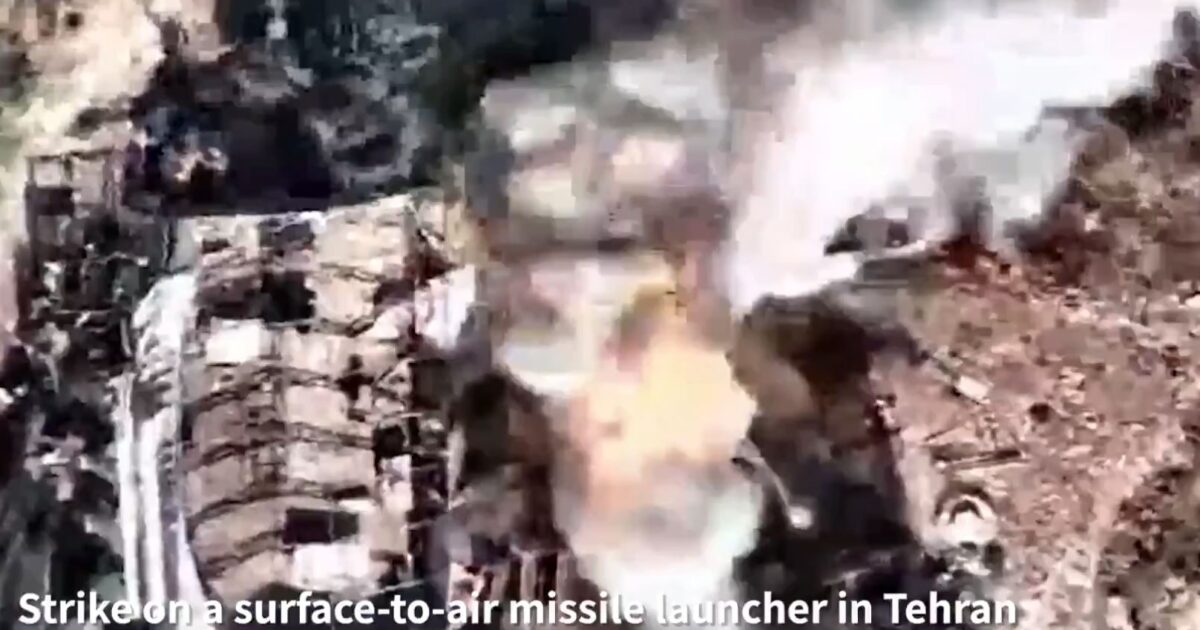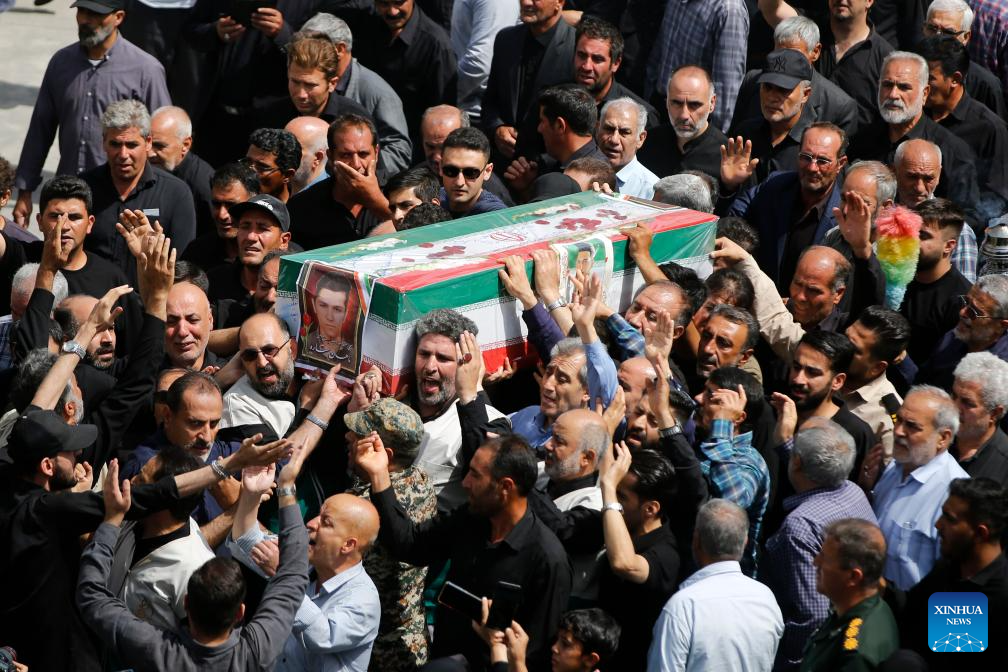Politics
Iran Holds Mass Funerals After Losing $4 Billion in Nuclear Assets and Top Military Leadership in US-Israeli Strikes

 Funerals held in Tehran for prominent nuclear scientists and high-ranking officers of the Islamic Revolutionary Guard Corps (IRGC) killed in U.S. and Israeli airstrikes. Photo courtesy of Xinhua.
Funerals held in Tehran for prominent nuclear scientists and high-ranking officers of the Islamic Revolutionary Guard Corps (IRGC) killed in U.S. and Israeli airstrikes. Photo courtesy of Xinhua.
Despite claims by mainstream media, combined airstrikes by the United States and Israel over the past two weeks were highly successful, inflicting significant damage on Iran’s nuclear program and eliminating key military leaders, including high-ranking officers of the Islamic Revolutionary Guard Corps (IRGC), a U.S.-designated terrorist organization that operates directly under Supreme Leader Ayatollah Ali Khamenei.
Iran held a massive state funeral in Tehran on Saturday for 60 individuals killed during its 12-day war with Israel, including top military commanders, nuclear scientists, and their family members. State media claimed that over one million people attended, with government offices closed to allow public employees to join the procession. The scale of the turnout underscored the severity of the blow to Iran’s military and scientific leadership during the coordinated U.S.-Israeli strikes.
In total, the combined attacks resulted in over 1,000 deaths, including at least 417 civilians, according to a U.S.-based human rights organization. Iran’s retaliatory campaign involved firing more than 550 ballistic missiles at Israel, killing 28 people before a ceasefire was declared.
Chants of “Death to America” and “Death to Israel” echoed throughout the procession, reflecting the domestic political pressure on Iran’s leadership in the aftermath of its strategic losses.
Among the dead were some of Iran’s most powerful military and scientific figures, representing the most significant loss of senior leadership since the Iran-Iraq War of the 1980s. Intelligence sources confirm that approximately 30 senior commanders were killed, including Major General Hossein Salami, head of the Islamic Revolutionary Guard Corps (IRGC), and Mohammad Bagheri, chief of staff of Iran’s armed forces. Also killed was Major General Gholamali Rashid, commander of the IRGC’s Khatam al-Anbiya Central Headquarters and former deputy chief of staff of the armed forces.
Amir Ali Hajizadeh, commander of the IRGC Aerospace Force and architect of Iran’s missile program, was among those eliminated. He had overseen Iran’s ballistic missile attacks on Israel in April 2024 and the 2020 missile strike on a U.S. base in Iraq. He also admitted responsibility for the 2020 downing of a Ukrainian passenger plane.
The strikes also targeted Iran’s nuclear apparatus. At least 11 nuclear scientists were confirmed killed, including figures from Iran’s Atomic Energy Organization and top universities. Notable casualties include Fereydoun Abbasi, former head of the Atomic Energy Organization (2011–2013), and Mohammad Mehdi Tehranchi, president of Islamic Azad University in Tehran. Other slain scientists include Abdolhamid Manouchehr, Ahmad Reza Zolfaghari, Amirhossein Feghi, and Motalibizadeh.
The campaign also eliminated key regime figures, including Ali Ghanaatkar, the notorious Evin Prison prosecutor known for imprisoning dissidents such as Nobel Peace Prize laureate Narges Mohammadi.
Israeli and U.S. strikes extended beyond Tehran, systematically targeting regional IRGC command structures and proxy networks. Saeed Izadi, longtime commander of the Palestine Corps of the Quds Force and a key coordinator between Iran and Hamas, was described by Israeli officials as “one of the main orchestrators of the October 7 massacre.”
Behnam Shahriyari, commander of the Quds Force’s Weapons Transfer Unit, was also killed; he was responsible for weapons shipments to Iran’s proxies across the Middle East. Multiple other intelligence chiefs and field commanders tied to Iran’s proxy network were reportedly eliminated.
According to the Institute for Science and International Security, the coordinated U.S.-Israeli strikes inflicted unprecedented destruction on Iran’s nuclear infrastructure. At Natanz, the “workhorse” of Iran’s enrichment program, underground halls housing over 18,400 centrifuges were severely damaged, rendering them inoperable. The above-ground Pilot Fuel Enrichment Plant, which contained roughly 1,700 advanced IR-4 and IR-6 centrifuges enriching uranium to 60%, was completely destroyed. This facility had served as Iran’s primary site for centrifuge research and development.
Following Israeli strikes, U.S. forces conducted precision “double tap” attacks using GBU-57 Massive Ordnance Penetrator (MOP) bombs, with successive bombs directed through the same penetration points. At Fordow, twelve MOPs targeted deeply buried enrichment halls, collapsing infrastructure around the cascade area. The Israel Atomic Energy Commission assessed the Fordow site as destroyed and inoperable.
The Isfahan nuclear complex was hit in three separate waves. Attacks destroyed the enriched uranium metal conversion plant, caused severe damage to uranium hexafluoride production facilities, and collapsed tunnel entrances to underground storage sites.
Conservative estimates place immediate Iranian losses from these nuclear strikes at $2–4 billion in direct damage, with potential reconstruction costs reaching $5–10 billion. This includes $200–500 million in lost centrifuge hardware, $1–2 billion for underground facility reconstruction, and $500 million to $1 billion in lost enrichment capacity and delays. Recovery will be further hindered by inflation, heightened security needs, and international procurement restrictions.
Beyond the nuclear program, the campaign devastated Iran’s broader military infrastructure. Multiple ballistic missile production facilities, storage sites, radar stations, air defense systems, and Quds Force command centers were destroyed. Intelligence assessments confirm that dozens of missile launchers and underground silos across Kermanshah, Tabriz, Isfahan, Tehran, and western Iran were eliminated. IRGC-run ammunition depots, radar installations, and key power infrastructure, including substations and backup generators, were also taken offline.
The Institute concluded that the strikes “effectively destroyed Iran’s centrifuge enrichment program,” estimating that it will be a long time before Iran can recover its previous capability. IDF Chief of Staff Lt. Gen. Eyal Zamir echoed this, stating: “We significantly damaged the nuclear program, and I can also say that we set it back by years—I repeat, years.”
The post Iran Holds Mass Funerals After Losing $4 Billion in Nuclear Assets and Top Military Leadership in US-Israeli Strikes appeared first on The Gateway Pundit.
Politics
President Trump Taps Dr. Ben Carson for New Role — A HUGE Win for America First Agenda

Dr. Ben Carson is the newest member of the Trump administration.
On Wednesday, former Secretary of the Department of Housing and Urban Development, Ben Carson, was sworn in as the national adviser for nutrition, health, and housing at the U.S. Department of Agriculture.
Agriculture Secretary Brooke Rollins shared that Carson’s role will be to oversee Trump’s new Big Beautiful Bill law, which aims to ensure Americans’ quality of life, from nutrition to stable housing.
After being sworn in, Carson shared, “Today, too many Americans are suffering from the effects of poor nutrition. Through common-sense policymaking, we have an opportunity to give our most vulnerable families the tools they need to flourish.”
WATCH:
BREAKING Dr. Ben Carson has been sworn in as the National Nutrition Advisor to Make America Healthy Again
THIS IS A HUGE WIN pic.twitter.com/Dr5AsSDkRM
— MAGA Voice (@MAGAVoice) September 24, 2025
Per USDA:
Today, U.S. Secretary of Agriculture Brooke L. Rollins announced that Dr. Benjamin S. Carson, Sr., M.D., was sworn in as the National Advisor for Nutrition, Health, and Housing at the U.S. Department of Agriculture (USDA).
“There is no one more qualified than Dr. Carson to advise on policies that improve Americans’ everyday quality of life, from nutrition to healthcare quality to ensuring families have access to safe and stable housing,” said Secretary Rollins.
“With six in ten Americans living with at least one chronic disease, and rural communities facing unique challenges with respect to adequate housing, Dr. Carson’s insight and experience is critical. Dr. Carson will be crucial to implementing the rural health investment provisions of the One Big Beautiful Bill and advise on America First polices related to nutrition, health, and housing.
“As the U.S. Secretary of Housing and Urban Development in the first Trump Administration, Dr. Carson worked to expand opportunity and strengthen communities, and we are honored to welcome him to the second Trump Administration to help lead our efforts here at USDA to Make America Healthy Again and ensure rural America continues to prosper.”
“Today, too many Americans are suffering from the effects of poor nutrition. Through common-sense policymaking, we have an opportunity to give our most vulnerable families the tools they need to flourish,” said Dr. Ben Carson. “I am honored to work with Secretary Rollins on these important initiatives to help fulfill President Trump’s vision for a healthier, stronger America.”
On Sunday, Dr. Carson was one of the many speakers at the memorial service of the late TPUSA founder Charlie Kirk.
During the memorial service, Carson highlighted that Kirk was shot at 12:24 p.m. and then continued to share the Bible verse John 12:24, which reads, “Verily, verily, I say unto you, Except a corn of wheat fall into the ground and die, it abideth alone: but if it die, it bringeth forth much fruit.”
WATCH:
Ben Carson reads John 12:24 at the Charlie Kirk’s funeral. Charlie was shot at 12:24.
It reads: “Very truly I tell you, unless a kernel of wheat falls to the ground and dies, it remains only a single seed. But if it dies, it produces many seeds”
God is moving and speaking. pic.twitter.com/0ZbVTAwwYl
— Danny Botta (@danny_botta) September 21, 2025
The post President Trump Taps Dr. Ben Carson for New Role — A HUGE Win for America First Agenda appeared first on The Gateway Pundit.
Politics
LEAKED MEMO: Deep State Prosecutors in the Eastern District of Virginia Claim There Isn’t Enough Evidence to Convict Comey Amid Reports of Imminent Indictment


On Wednesday evening, disgruntled officials in the Eastern District of Virginia leaked contents of a memo explaining why charges should not be brought against James Comey.
As reported earlier, former FBI Director James Comey is expected to be indicted in the Eastern District of Virginia in the next few days.
Comey will reportedly be charged for lying to Congress in a 2020 testimony about whether he authorized leaks to the media.
Officials in the Eastern District of Virginia are still fighting to stop Comey from being charged after Trump fired US Attorney Erik Siebert.
President Trump last week fired Erik Siebert as the US Attorney for the Eastern District of Virginia because he refused to bring charges against Letitia James, Comey, Schiff and others.
On Saturday evening, President Trump announced that he had appointed Lindsey Halligan – his personal attorney who defended him against the Mar-a-Lago raid – as US Attorney for the Eastern District of Virginia.
Now, with just days to go before the statute of limitations runs out to charge Comey for lying during a September 30, 2020 testimony, Lindsey Halligan is reportedly gearing up to indict Comey.
Prosecutors reportedly gave newly sworn-in Halligan a memo defending James Comey and explaining why charges should not brought against the fired FBI Director.
Per MSNBC’s Ken Dilanian:
Two sources familiar with the matter tell me prosecutors in the EDVA US attorney‘s office presented newly sworn US attorney Lindsey Halligan with a memo explaining why charges should not be brought against James Comey, because there isn’t enough evidence to establish probable cause a crime was committed, let alone enough to convince a jury to convict him.
Justice Department guidelines say a case should not be brought unless prosecutors believe it’s more likely than not that they can win a conviction beyond a reasonable doubt.
Two sources familiar with the matter tell me prosecutors in the EDVA US attorney‘s office presented newly sworn US attorney Lindsey Halligan with a memo explaining why charges should not be brought against James Comey, because there isn’t enough evidence to establish probable…
— Ken Dilanian (@DilanianMSNBC) September 24, 2025
The post LEAKED MEMO: Deep State Prosecutors in the Eastern District of Virginia Claim There Isn’t Enough Evidence to Convict Comey Amid Reports of Imminent Indictment appeared first on The Gateway Pundit.
Politics
Nearly 8 in 10 Voters Say the United States is in Political Crisis After the Assassination of Charlie Kirk

Nearly eight in ten voters believe that the United States is in a political crisis in the wake of the assassination of conservative icon Charlie Kirk.
According to a Quinnipiac University national poll of registered voters released on Wednesday, a massive 93 percent of Democrats, 84 percent of independents, and 60 percent of Republicans said the nation is in a political crisis.
“The Kirk assassination lays bare raw, bipartisan concerns about where the country is headed,” Quinnipiac University Polling Analyst Tim Malloy said of the poll results.
Quinnipiac reports:
Seventy-one percent of voters think politically motivated violence in the United States today is a very serious problem, 22 percent think it is a somewhat serious problem, 3 percent think it is a not so serious problem, and 1 percent think it is not a problem at all.
This is a jump from Quinnipiac University’s June 26 poll when 54 percent thought politically motivated violence in the United States today was a very serious problem, 37 percent thought it was a somewhat serious problem, 6 percent thought it was a not so serious problem, and 2 percent thought it was not a problem at all.
Nearly 6 in 10 voters (58 percent) think it will not be possible to lower the temperature on political rhetoric and speech in the United States, while 34 percent think it will be possible.
Over half, 54 percent, of voters believe the US will see increased political violence over the next few years. Another 27 percent said they think it will stay “about the same,” while just 14 percent believe it will ease.
A 53 percent majority also said they are “pessimistic about freedom of speech being protected in the United States.”
Surprisingly, a 53 percent majority also believes the current system of democracy is not working.
“From a perceived assault on freedom of speech to the fragility of the democracy, a shudder of concern and pessimism rattles a broad swath of the electorate. Nearly 80 percent of registered voters feel they are witnessing a political crisis, seven in ten say political violence is a very serious problem, and a majority say this discord won’t go away anytime soon,” Malloy added.
The vast majority, 82 percent, said the way that people discuss politics is contributing to the violence.
“When asked if political discourse is contributing to violence, a rare meeting of the minds…Republicans, Democrats, and independents in equal numbers say yes, it is,” Malloy said.
The survey was conducted from September 18 to 21 among 1,276 registered voters with a margin of error of +/- 3.3 percentage points.
The post Nearly 8 in 10 Voters Say the United States is in Political Crisis After the Assassination of Charlie Kirk appeared first on The Gateway Pundit.
-

 Entertainment6 months ago
Entertainment6 months agoNew Kid and Family Movies in 2025: Calendar of Release Dates (Updating)
-

 Entertainment3 months ago
Entertainment3 months agoBrooklyn Mirage Has Been Quietly Co-Managed by Hedge Fund Manager Axar Capital Amid Reopening Drama
-
Tech6 months ago
The best sexting apps in 2025
-

 Entertainment5 months ago
Entertainment5 months agoKid and Family TV Shows in 2025: New Series & Season Premiere Dates (Updating)
-

 Tech7 months ago
Tech7 months agoEvery potential TikTok buyer we know about
-
Tech7 months ago
iOS 18.4 developer beta released — heres what you can expect
-

 Tech7 months ago
Tech7 months agoAre You an RSSMasher?
-

 Politics7 months ago
Politics7 months agoDOGE-ing toward the best Department of Defense ever





